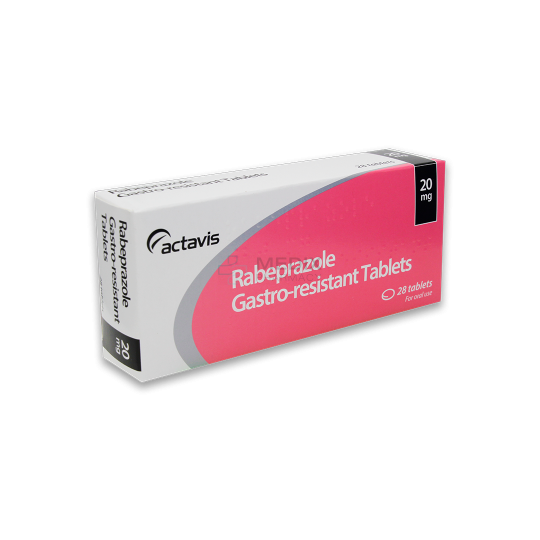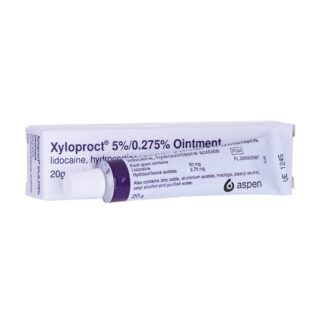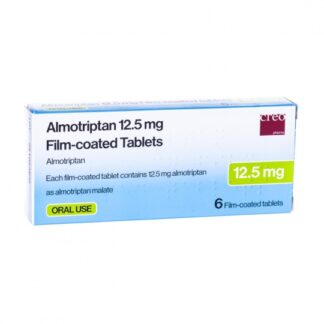- Proton pump inhibitor
- Reduces stomach acidity
- Prevents acid reflux
- Authentic medication
- Sourced in the UK
Rabeprazole
Rabeprazole Gastro-resistant Tablets are a medication that contains proton pump inhibitors used for gastric acid suppression. It mainly reduces the amount of acid made by the stomach. This medication is used for the treatment of symptoms of Zollinger-Ellison syndrome, GORD, and such.
- Proton pump inhibitor
- Reduces stomach acidity
- Prevents acid reflux
- Authentic medication
- Sourced in the UK
Fast Ordering
No appointment’s necessary, orders filled quickly
100% Confidentiality
Your information is secured and private
Discreet Packaging
Standard package with no stamps or markings
UK Medication
Dispensed by registered UK pharmacists
Frequently Asked Questions
What is Rabeprazole?
Rabeprazole Gastro-resistant Tablets is a medication that contains proton pump inhibitors used for gastric acid suppression. It mainly reduces the amount of acid made by the stomach.
What are Rabeprazole ingredients?
Rabeprazole Gastro-Resistant Tablets contain the active substance Rabeprazole sodium. Each tablet contains 20 mg Rabeprazole sodium or equivalent of 18.85 mg Rabeprazole. The other ingredients are mannitol (E421), light magnesium oxide (E530), hydroxypropyl cellulose (E463), low-substituted hydroxypropyl cellulose (E463) and magnesium stearate (E572) in the tablet core, and ethylcellulose (E462), light magnesium oxide (E530), hypromellose phthalate, diacetylated monoglycerides (E472a), talc (E553b), titanium dioxide (E171), red iron oxide (E172) (10 mg only) and yellow iron oxide (E172) (20 mg only) in the coating.
What it is Rabeprazole used for?
Rabeprazole is used to:
- Prevent and treat stomach ulcers (Active duodenal ulcer or active benign gastric/stomach ulcer or peptic ulcers).
- Combine with two antibiotics (clarithromycin and amoxicillin) for the eradication of H pylori infections in patients with peptic ulcer disease.
- Reduce the amount of acid the stomach makes. Usually, it is used to treat a rare condition in patients whose stomachs make extremely high amounts of acid. This condition is called Zollinger-Ellison syndrome.
- Treat the symptoms of GORD. Gastroesophageal reflux disease (GORD) is a condition in which acid flow in the stomach causes heartburn and possible injury of the oesophagus (the tube that connects the throat and stomach). GORD causes a patient to keep on getting acid reflux.
Want To Know More About Rabeprazole?
Like with all medicines, tell your doctor if you are allergic to Rabeprazole or other proton pump inhibitors. If you are, do not use this medicine. Check other ingredients to see if you are allergic to any of them. Also inform your doctor or pharmacist if:
- You have been told you have a stomach tumor
- You have a history of liver disease
- You have osteoporosis or you are taking corticosteroids (which can increase the risk of osteoporosis)
If you are pregnant, think you might be pregnant, or planning to be pregnant, do not take this medicine. Ask your doctor or health provider first for advice or prescription.
Do not take Rabeprazole tablets if you are breastfeeding or planning to breastfeed.
Rabeprazole is not recommended and should not be taken by children.
Other Medicines and Rabeprazole
Tell your doctor if you are taking, have recently taken, or might take any of the following medicines:
- ketoconazole or itraconazole (drugs used to treat fungal infections)
- atazanavir (a drug used to treat HIV)
Do not take more tablets than what you are prescribed in a day. If you have accidentally taken more tablets than what is needed for the day, seek medical attention, and bring along with you the carton and the tablets. This way, your health provider will know which tablets you have taken.
If you forget to take Rabeprazole sodium, just take the tablet as soon as you remember it. If you forget to take the medicine for more than 5 days, do not continue the tablet and ask your doctor for further instructions. Do not take a double dosage to make up for the tablet you have forgotten to take.
Do not stop taking the tablets without discussing it with your doctor.
Possible side effects may occur as with all other medicines although not everyone will get them. Some common side effects (can affect up to 1 in 10 people) are:
- Insomnia
- Infections
- Dizziness
- Headaches
- Cough
- Pharyngitis (sore throat)
- Rhinitis (runny nose)
- Diarrhoea
- Vomiting
- Nausea
- Abdominal pain
- Constipation
- Flatulence (wind)
- Pain without any known cause, back pain
- Asthenia (weakness)
Uncommon side effect (may affect up to 1 in 100 people):
- Nervousness or drowsiness
- Bronchitis, sinusitis
- Dyspepsia (indigestion)
- Dry mouth
- Eructation (belching)
- Skin rash
- Redness of the skin
- Muscle or joint pain, leg cramps, fracture of the hip, wrist, or spine
- Urinary tract infection
- Chest pain
- Chills, fever
- Changes in liver function test values
Rare (may affect up to 1 in 1,000 people):
- Anorexia (loss of appetite)
- Depression
- Hypersensitivity – a severe immediate allergic reaction, for example, facial swelling, low blood pressure, and shortness of breath
- Vision disturbances
- Gastritis (upset stomach or stomach pain), stomatitis (sore mouth), taste disturbances
- Liver problems such as hepatitis (inflammation of the liver) and jaundice (yellowing of your skin and whites of your eyes)
- Itching, sweating, skin blisters
- Kidney problems such as interstitial nephritis
- Weight gain
- Changes in white blood cell count
- Thrombocytopenia (bleeding or bruising more easily than normal)
Stop taking Rabeprazole sodium and see a doctor straight away if you notice reddening of the skin with blisters or peeling. There may also be severe blisters and bleeding in the lips, eyes, mouth, nose, and genitals. This could be the symptoms of Stevens-Johnson syndrome or toxic epidermal necrolysis.
Always follow your doctor or physician’s instruction exactly on how you should take the medicine. Do not chew or break the tablet. Swallow it whole with some water.
Dosage
- Active duodenal ulcer: The usual dosage of Rabeprazole is one tablet of 20mg once a day. The medication usually prescribed by doctors is four weeks. After that time, your doctor may decide to continue the treatment for four more weeks. Do not continue taking the medicine without the advice of your doctor. Likewise, do not discontinue taking the medication during treatment.
- Active benign gastric ulcer: The usual dosage of Rabeprazole is one tablet of 20mg once a day. The medication usually prescribed by doctors is six weeks. After that time, your doctor may decide to continue the treatment for a further six weeks. Do not continue taking the medicine without the advice of your doctor. Likewise, do not discontinue taking the medication during treatment.
- Erosive or ulcerative gastro-oesophageal reflux disease: The usual dose is 20mg of Rabeprazole, one tablet per day for four weeks. After taking the medication for four weeks, visit your doctor for further instructions.
- GORD (Gastroesophageal reflux disease) maintenance: The usual dosage is 10mg or 20 mg, depending on the severity of your symptoms. Regular interval of doctor visits is needed so the doctor can review your treatment and symptoms. Ask your doctor how long you should take the medicine. Follow the instruction strictly.
- Symptomatic GORD: The usual dosage is one tablet of Rabeprazole 10 mg per day. This once-daily treatment is expected to continue for four weeks. If your symptoms do not resolve after four weeks, consult your doctor for another prescription. Do not continue this medication by yourself. Seek professional advice.
- Zollinger-Ellison syndrome: The recommended dosage is three tablets of Rabeprazole 20mg once a day. Your doctor will advise you on how many tablets to take and when to take them. Your doctor may adjust the dosage depending on how you reacted to the medicine.
- Eradication of H. pylori: The usual recommended dose is Rabeprazole sodium 20 mg to be taken (in combination with two antibiotics – clarithromycin 500 mg and Amoxycillin 1g) twice each day and normally for 7 days. Symptoms will normally be relieved before the ulcer has completely healed. Therefore, it is important that you not stop taking the tablets until told to do so by your doctor.
Rabeprazole is available online at True Medical. A prescription or consultation with a medical professional is necessary for the order to be supplied. You are advised to follow instructions on the packaging to avoid any misuse or unwanted effects of the product. You may opt for next day delivery service upon checkout of your order to receive the product at your doorstep the following day.




